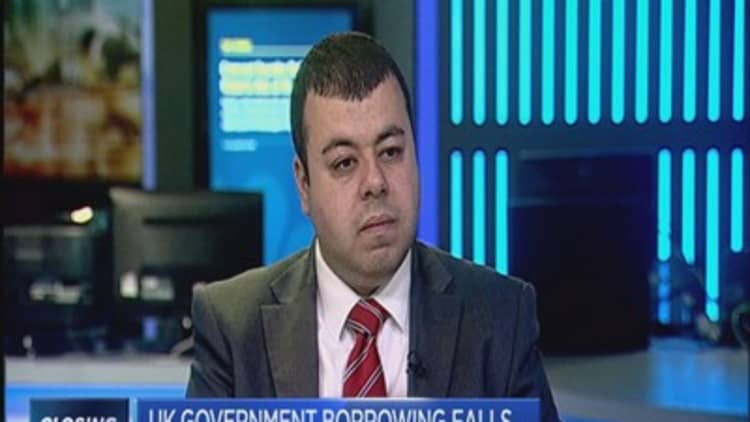An improving economy, a strengthening jobs market and hawkish comments from central bank officials: Sounds like the U.S. but it's the U.K. where talk of higher interest rates is getting louder.
Martin Weale, one of the more hawkish members of the Bank of England's (BoE) Monetary Policy Committee (MPC), said this week that the country should get ready for a rise in borrowing costs as early as August, the Financial Times reported.
A rate hike may not be imminent but the remarks are significant, economists say. That's because they highlight a difference of opinion emerging from the nine-member Monetary Policy Committee, which was unanimous in its decision to keep rates at a record low of 0.5 percent in June.
In addition, labor market conditions are proving stronger-than-expected. Data released last week showed that workers' pay in the U.K. grew at the fastest rate in almost four years in the three months to April.
Read MoreConfidence 'wavering' on Fed rate hike: LaVorgna
"There is sufficient momentum in the labour market now to suggest that there will be a rate rise early next year," Simon French, UK Economist at investment firm Panmure, told CNBC on Thursday.
"In terms of the actual rate decision, we need to look at what the individual MPC members are saying," he added.
Talk the talk
With inflation running well below the BoE's 2 percent target (it rose 0.1 percent in the year to May), analysts say there's no immediate pressure to raise rates.
But Weale told the FT that rising wages and low unemployment pointed to a tightening labor market that would probably need a response even if inflation was held down longer than expected because of lower oil prices.
Another MPC member, Kristen Forbes, wrote last month in London's Evening Standard that low inflation would be temporary and that monetary policy would need to be tightened as the economy recovered from the financial crisis.

"While it appears that the voting pattern of the MPC is set to split again soon, it could still be some time before there is a majority vote in favour of a rate hike," Jane Foley, a senior currency strategist at Rabobank said in a note on Wednesday.
"Nevertheless, the strength of the recently released wage data combined with recent hawkish remarks from Forbes and now Weale has reignited market speculation that the MPC could be willing to hike interest rates by the end of this year," she said.
The rate hike speculation is being felt in markets, helping push sterling to a seven-year high against a trade-weighted basket of currencies this week.
Walk the walk
Still, analysts do not expect the BoE to make a move before the U.S. Federal Reserve, which is widely tipped to deliver its first rate hike in nine years in September as the U.S. economy rebounds.
"I think they (BoE policy makers) want to see the Fed move first and assess what impact that has on markets," said Panmure's French.
Read MoreGreek deal at risk from political rebellion
The BoE, like the Fed, has kept rates at record lows since the global financial crisis to support growth.
"I expect Britain to raise rates in February after the Fed," Berenberg Bank's Chief Economist, Holger Schmieding, told CNBC on Wednesday. "Britain is closer to the euro zone, so it probably watches it a bit more closely than the Fed does. There is some fear of contagion here so (BOE chief) Mark Carney will want to play it safe and wait a bit longer than the Fed before he starts."
Schmieding was referring to the crisis in Greece, which is expected to default on its debt if it cannot secure further funding from its creditors with ramifications for investor confidence and the economic outlook across Europe.


